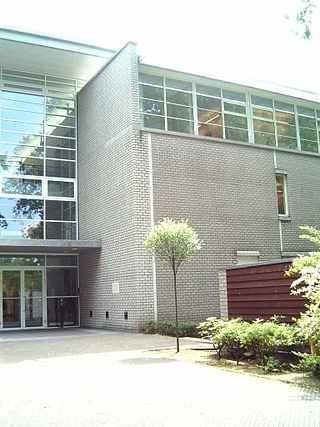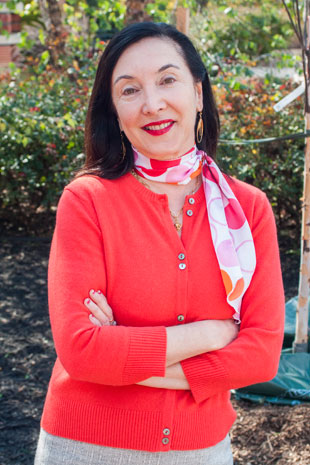Psycholinguistics or psychology of language is the study of the interrelation between linguistic factors and psychological aspects. The discipline is mainly concerned with the mechanisms by which language is processed and represented in the mind and brain; that is, the psychological and neurobiological factors that enable humans to acquire, use, comprehend, and produce language.
Elizabeth Ann Bates was a professor of cognitive science at the University of California, San Diego. She was an internationally renowned expert and leading researcher in child language acquisition, psycholinguistics, aphasia, and the neurological bases of language, and she authored 10 books and over 200 peer-reviewed articles and book chapters on these subjects. Bates was well known for her assertion that linguistic knowledge is distributed throughout the brain and is subserved by general cognitive and neurological processes.
Doreen Kimura was a Canadian psychologist who was professor at the University of Western Ontario and professor emeritus at Simon Fraser University. Kimura was recognized for her contributions to the field of neuropsychology and later, her advocacy for academic freedom. She was the founding president of the Society for Academic Freedom and Scholarship.
Bilingualism, a subset of multilingualism, means having proficiency in two languages. A bilingual individual is traditionally defined as someone who understands and produces two languages on a regular basis. A bilingual individual's initial exposure to both languages may start in early childhood, e.g. before age 3, but exposure may also begin later in life, in monolingual or bilingual education. Equal proficiency in a bilingual individuals' languages is rarely seen as it typically varies by domain. For example, a bilingual individual may have greater proficiency for work-related terms in one language, and family-related terms in another language.
Ellen Bialystok, OC, FRSC is a Canadian psychologist and professor. She carries the rank of Distinguished Research Professor at York University in Toronto, Ontario where she is director of the Lifespan Cognition and Development Lab. She is also an associate scientist at the Rotman Research Institute of the Baycrest Centre for Geriatric Care.
Brian James MacWhinney is a Professor of Psychology and Modern Languages at Carnegie Mellon University. He specializes in first and second language acquisition, psycholinguistics, and the neurological bases of language, and he has written and edited several books and over 100 peer-reviewed articles and book chapters on these subjects. MacWhinney is best known for his competition model of language acquisition and for creating the CHILDES and TalkBank corpora. He has also helped to develop a stream of pioneering software programs for creating and running psychological experiments, including PsyScope, an experimental control system for the Macintosh; E-Prime, an experimental control system for the Microsoft Windows platform; and System for Teaching Experimental Psychology (STEP), a database of scripts for facilitating and improving psychological and linguistic research.
Language production is the production of spoken or written language. In psycholinguistics, it describes all of the stages between having a concept to express and translating that concept into linguistic forms. These stages have been described in two types of processing models: the lexical access models and the serial models. Through these models, psycholinguists can look into how speeches are produced in different ways, such as when the speaker is bilingual. Psycholinguists learn more about these models and different kinds of speech by using language production research methods that include collecting speech errors and elicited production tasks.

The Max Planck Institute for Psycholinguistics is a research institute located on the campus of Radboud University Nijmegen in Nijmegen, Gelderland, the Netherlands. The institute was founded in 1980 by Dutch psycholinguist Pim Levelt and is dedicated exclusively to psycholinguistics. It is one of the few institutes of the Max Planck Society situated outside Germany. According to the ranking of Web of World Research Centers, the institute ranks second amongst all Max Planck Institutes (MPI) in terms of visibility and eighth in terms of size.

Laura-Ann Petitto is a cognitive neuroscientist and a developmental cognitive neuroscientist known for her research and scientific discoveries involving the language capacity of chimpanzees, the biological bases of language in humans, especially early language acquisition, early reading, and bilingualism, bilingual reading, and the bilingual brain. Significant scientific discoveries include the existence of linguistic babbling on the hands of deaf babies and the equivalent neural processing of signed and spoken languages in the human brain. She is recognized for her contributions to the creation of the new scientific discipline, called educational neuroscience. Petitto chaired a new undergraduate department at Dartmouth College, called "Educational Neuroscience and Human Development" (2002-2007), and was a Co-Principal Investigator in the National Science Foundation and Dartmouth's Science of Learning Center, called the "Center for Cognitive and Educational Neuroscience" (2004-2007). At Gallaudet University (2011–present), Petitto led a team in the creation of the first PhD in Educational Neuroscience program in the United States. Petitto is the Co-Principal Investigator as well as Science Director of the National Science Foundation and Gallaudet University’s Science of Learning Center, called the "Visual Language and Visual Learning Center (VL2)". Petitto is also founder and Scientific Director of the Brain and Language Laboratory for Neuroimaging (“BL2”) at Gallaudet University.
Ping Li is currently Sin Wai Kin Professor in Humanities and Technology, Chair Professor of Neurolinguistics and Bilingual Studies, and Dean of the Faculty of Humanities at the Hong Kong Polytechnic University (PolyU). Prior to joining PolyU, he was a Professor of Psychology, Linguistics, and Information Sciences and Technology, and Associate Director of the Institute for Computational and Data Sciences at Pennsylvania State University. His research interests are in language acquisition, bilingualism, and reading comprehension in both children and adults. He uses digital technologies and cognitive neuroscience methods to study neuroplasticity and individual differences in learning, so as to understand the relationships among languages, cultures, technology, and the brain. Li received a B.A. in Chinese linguistics from Peking University in 1983, an M.A. in theoretical linguistics from Peking University, a Ph.D. in psycholinguistics from Leiden University and the Max Planck Institute for Psycholinguistics in 1990, and completed post-doctoral fellowships at the Center for Research in Language at the University of California, San Diego and the McDonnell-Pew Center for Research in Cognitive Neuroscience in 1992. Li has been employed at the Chinese University of Hong Kong (1992–1996), the University of Richmond (1996–2006), and Pennsylvania State University (2008–2019), and he has also served as Program Director for the Perception, Action, and Cognition Program and the Cognitive Neuroscience Program at the National Science Foundation (2007–2009). Li was also President of the Society for Computation in Psychology and is currently Editor of Brain and Language, Elsevier and Senior Editor of Cognitive Science, Wiley. He is an elected Fellow of the American Association for the Advancement of Science (AAAS).
Judith F. Kroll is a Distinguished Professor of Language Science at University of California, Irvine. She specializes in psycholinguistics, focusing on second language acquisition and bilingual language processing. With Randi Martin and Suparna Rajaram, Kroll co-founded the organization Women in Cognitive Science in 2001. She is a Fellow of the American Association for the Advancement of Science (AAAS), the American Psychological Association (APA), the Psychonomic Society, the Society of Experimental Psychologists, and the Association for Psychological Science (APS).
Prof. Vivian James Cook was a British linguist who was Emeritus Professor of Applied Linguistics at Newcastle University.
Viorica Marian is a Moldovan-born American psycholinguist, cognitive scientist, and psychologist known for her research on bilingualism and multilingualism. She is the Ralph and Jean Sundin Endowed Professor of Communication Sciences and Disorders, and professor of psychology at Northwestern University. Marian is the principal investigator of the Bilingualism and Psycholinguistics Research Group. She received her PhD in psychology from Cornell University, and master's degrees from Emory University and from Cornell University. Marian studies language, cognition, the brain, and the consequences of knowing more than one language for linguistic, cognitive, and neural architectures.
Wallace E. Lambert was a Canadian psychologist and a professor in the psychology department at McGill University (1954–1990). Among the founders of psycholinguistics and sociolinguistics, he is known for his contributions to social and cross-cultural psychology, language education, and bilingualism.
Loraine Katherine Obler is an American linguist and neuroscientist, internationally recognized as a leading scholar in the field of neurolinguistics and multilingualism. She is known for her contributions to understanding how language-related behavior is controlled within the brain. Her work spans diverse sub-disciplines such as the neurolinguistics of bilingualism, language processing in aging and Alzheimer's disease, and the cross-language study of aphasia.
Alice Fenvessy Healy is a psychologist and College Professor of Distinction Emeritus at the University of Colorado Boulder where she founded and directed the Center for Research on Training. She is known for her research in the field of cognitive psychology, spanning diverse topics including short-term memory, long-term memory, psycholinguistics, reading, decision-making, and cognitive training.
Randi Martin is the Elma Schneider Professor of Psychology at Rice University and Director of the T. L. L. Temple Foundation Neuroplasticity Research Laboratory. With Suparna Rajaram and Judith Kroll, Martin co-founded Women in Cognitive Science in 2001, an organization supported in part through the National Science Foundation's ADVANCE Leadership program. She is a Fellow of the American Association for the Advancement of Science (AAAS) and the Society of Experimental Psychologists (SEP).

Language brokering, also known as child language brokering, refers to the informal act of translation by children and young people between a family member and a dominant language speaker, whereby children can influence both the message and its portrayal. Because their inter-family language differs from the predominant language in society, these children are or must become bilingual.
Debra Titone is a cognitive psychologist known for her research on bilingualism and multilingualism. She is currently a Professor of Psychology and a chair holder of Canada Research in Language & Multilingualism at McGill University. Titone is a founding member and officer of the professional society, Women in Cognitive Science. She and her colleagues have written about gender disparities in opportunities, along with the advancement of women the field of cognitive science, with specific reference to Canada.
Caroline Palmer is the Canada Research Chair in Cognitive Neuroscience of Performance and Professor in the Department of Psychology at McGill University in Montreal, Canada. She is also an Associate Faculty Member in the Schulich School of Music at McGill. Her research in cognitive science addresses the behavioural and neural foundations that make it possible for people to produce auditory sequences such as playing a musical instrument or speaking. Palmer has developed and empirically tested computational models of how people perceive and produce auditory sequences, and how they coordinate their actions with others.


